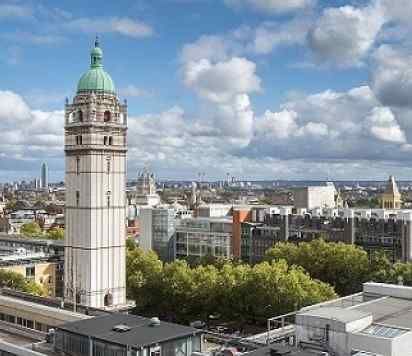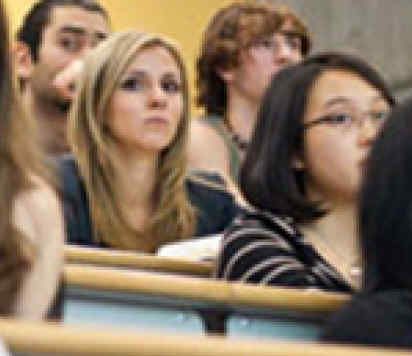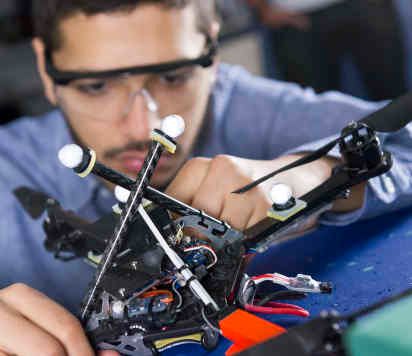The Centre for Composite Materials at Imperial College commenced activities in October 1983 following the recommendations of a College working party set up in 1981 by the then Rector, Lord Flowers. Professor Frank Matthews was appointed as the Director of the Centre, which was overseen by a steering committee chaired by Professor Don Pashley (Department of Materials).
Membership of the committee was drawn from senior academics from Aeronautics, Mechanical Engineering and Materials departments, together with representatives from industry.
Eight College departments were linked to the Centre: Aeronautics, Mechanical Engineering, Materials, Chemical Engineering, Chemistry, Physics, Mathematics and Civil Engineering, with most activity located in the first three.
A key move was to establish the Industrial Affiliates Programme, members of which received a range of benefits in return for an annual subscription. Via the steering committee and the affiliates, strong links were established with major companies in the UK and abroad, which included: British Aerospace, Rolls-Royce, Westland Helicopters, the Royal Aerospace Establishment/ Defence Evaluation and Research Agency/QinetiQ, National Physics Laboratory, GKN, Ciba Geigy, Hexcel Kobe (Japan), Du Pont (USA), Enichem (Italy), DSM (Holland) and Shell (Holland).
While the use of composite materials is widespread today in all sectors, their usage back in the 1960s was very different. Composite materials were limited only to some components of an aircraft. The Centre for Composite Materials provided the knowledge and know-how, both theoretically and experimentally, to the scientific community and industry, and aided the development of composite materials for various applications and industrial sectors.
Major collaborative research programmes covered in the Centre include: load transfer in composite structures, repair durability of fibre-reinforced plastics, effect of constituents' properties on mechanical performance, modelling of fatigue growth in components, design of bonded repairs, numerical simulation of processing of thick composites.
The Centre for Composite Materials gained further national and international recognition when it organised and hosted the combined 6th International Conference on Composite Materials (ICCM-VI)/2nd European Conference on Composite Materials (ECCM-II) at Imperial College on the 20-25 July 1987. There were over 800 delegates, then the largest attendance at an ICCM meeting. A significant number of conference papers were presented by members of the College.
From the outset, the Centre for Composite Materials also ran a number of Short Courses (Continuing Education) annually for people from industry on topics such as Introduction to Composites, Analysis of Composite Laminates, Design of Composite Components, and Finite Element Analysis of Composites. The Centre also organised a successful seminar series on joining composites that attracted many speakers and delegates from industry.
MSc Composites: the Science, Technology and Engineering Application of Advanced Composites
The short courses formed the basis of the MSc course launched in 1988, the first such postgraduate course in the UK. Lectures covered the whole spectrum of topics, later forming the content of the book 'Composite Materials: Engineering and Science' (Woodhead Publishing Ltd, ISBN-10: 1855734737, ISBN-13: 978-1855734739) authored by Professors Matthews and Rawlings, and still being used as a student textbook.
Lecturers on the course were drawn from the Centre, Aeronautics, Mechanical Engineering and Materials departments, and included visiting speakers from industry. Project work was usually sponsored by industry. In its early years, the course received several EPSRC grants for its students. Several graduates from the course now occupy senior positions in composite-related industries, such as Formula One. After the re-organisation of the Centre in 2001, the course came under the aegis of the Aeronautics Department.
A significant international collaboration was established with the launch in 1991 of EUPOCO, a European Masters course in composites based at the Katholieke Universiteit Leuven in Belgium with input from the Centre, as well as Université Catholique de Louvain, TU Delft, TU Aachen and Ecole des Mines de Paris. Several Imperial College staff lectured on the EUPOCO course and some of their students undertook their project work in the Centre of Composite Materials.
Following the retirement of Profeessor Frank Matthews in 2001, the Centre was headed by Professor Paul Robinson until 2017, who then became the Head of the Department of Aeronautics in 2017. The Centre is currently headed by Professor Emile Greenhalgh.


